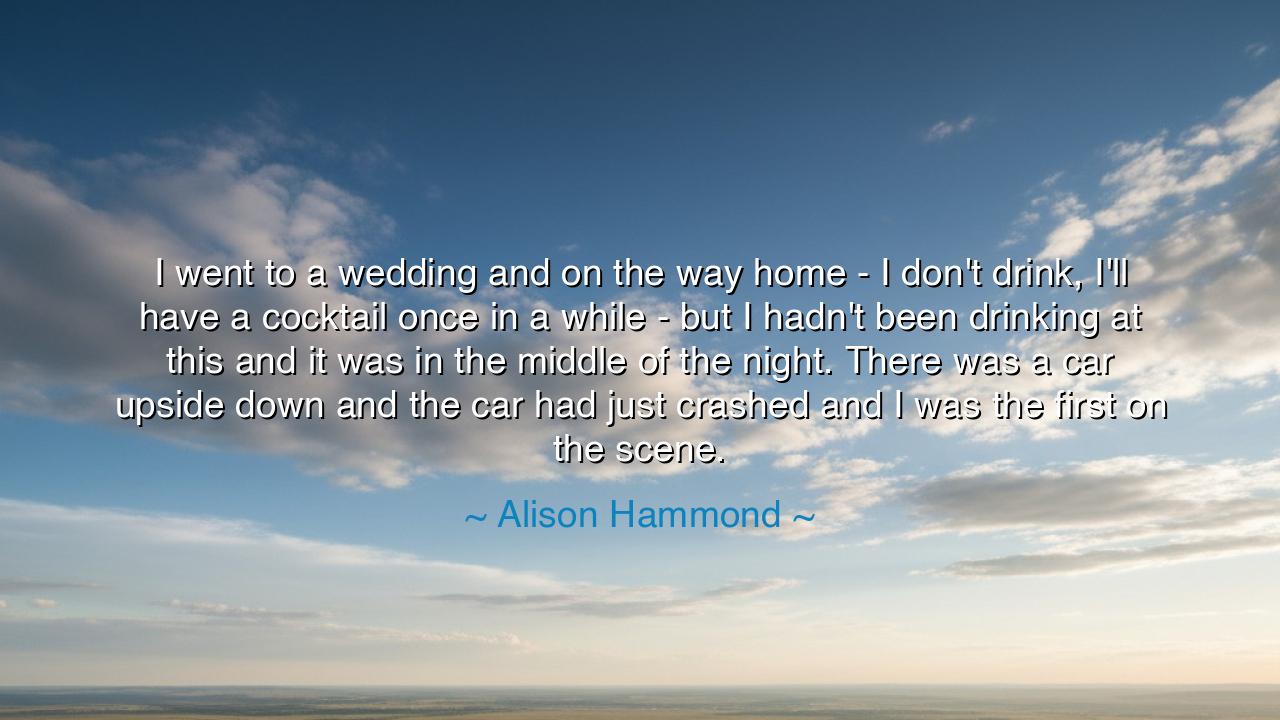
I went to a wedding and on the way home - I don't drink, I'll
I went to a wedding and on the way home - I don't drink, I'll have a cocktail once in a while - but I hadn't been drinking at this and it was in the middle of the night. There was a car upside down and the car had just crashed and I was the first on the scene.






Hearken, O seekers of courage and the vigilance of the soul, to the words of Alison Hammond, the witness of fate and fortitude: "I went to a wedding and on the way home—I don't drink, I'll have a cocktail once in a while—but I hadn't been drinking at this and it was in the middle of the night. There was a car upside down and the car had just crashed and I was the first on the scene." In this utterance lies the ancient truth that life often presents unforeseen trials, and that presence, awareness, and readiness are the instruments by which one meets danger and serves others.
In the theater of mortal existence, many travel their paths unaware of the fragility and unpredictability of life. Hammond illuminates that courage is not always summoned in advance; often it arises in the moment, through action and resolve. To be the first on the scene of calamity is to be the instrument of aid, embodying the timeless virtue of selflessness and vigilance, even when peril is sudden and unexpected.
Consider the life of Florence Nightingale, who, in the midst of war and chaos, arose to serve the wounded and the suffering. Like Hammond, she confronted danger without prior expectation, guided by duty and observation. The readiness to act, even under conditions of uncertainty, allowed her to save lives and transform the practice of care. In both instances, awareness and decisive action were the keys to meeting the needs of the moment.
The ancients, who chronicled the deeds of heroes, warriors, and healers, understood that valor is measured not in preparation alone but in response to circumstance. The soldier who rushes to aid the fallen, the philosopher who steps forward to defend truth, the healer who tends the afflicted—each embodies the principle that the first response is often the truest test of courage and character.
Yet this teaching carries subtle depth: being first on the scene demands clarity of mind, calm of spirit, and a commitment to act with wisdom. Hammond’s insight urges the seeker to cultivate vigilance and moral readiness, for life’s trials do not announce themselves, and preparedness of heart is as essential as readiness of body.
Therefore, O children of courage and attentiveness, let this teaching lodge in your hearts: in the unforeseen moments of peril, it is awareness, resolve, and swift action that shape destiny and safeguard life. By embracing presence and readiness, one honors the eternal wisdom of the ancients, who knew that true valor is revealed not in anticipation alone, but in the decisive acts that rise from clarity, compassion, and the call of circumstance.






GKDong Gia Khanh
It’s a powerful and jarring experience to witness an accident like that, especially in the middle of the night. I wonder if this kind of event changes the way people view their daily lives afterward. Do you think it would make you more cautious in the future or more focused on living in the moment? It’s so easy to take the little things for granted, but moments like these can really shift our perspective on life.
DNThuy Duong Nguyen
This quote really highlights how unpredictable life can be. You go to a wedding, not expecting anything out of the ordinary, and then you’re suddenly thrust into a life-or-death situation. It’s a reminder that we should all be prepared to react in emergencies, whether we’ve had time to think about it or not. How often do we really think about what we’d do if we were in a crisis?
Tthachthithao
I can’t imagine being the first on the scene of an accident. The adrenaline must have been overwhelming. But, it also makes me wonder – how do people even know what to do in those moments? I know it’s easy to say 'I’d call for help,' but do most of us really know how to handle something like this? Was Alison trained in emergency response, or was it just pure instinct?
NPNhu Pham
I find it so interesting that she mentions not having been drinking, because that probably helped her keep a clear head in such a stressful situation. But what if she had been, would it have impacted how she responded? It's a reminder of how important it is to be aware of our surroundings and stay present, especially when it comes to driving or just being in the right place at the right time.
MTKhong Minh Toan
It's really incredible that Alison was able to react quickly and responsibly in such a frightening moment. In moments like these, it seems like there's no time to think, only to act. Do you think it's possible to truly be prepared for something like this? It makes me curious about how people handle stress and whether it's something that can be learned or is just instinctive.